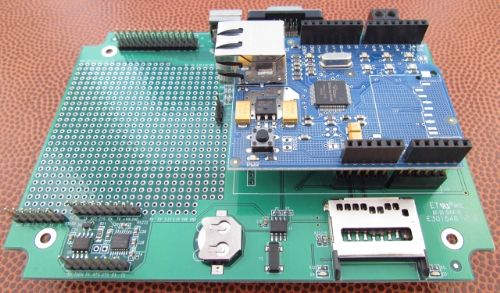
|

|
Forum Index : Microcontroller and PC projects : MM ethernet/Webserver
| Author | Message | ||||
| StoveMan Regular Member Joined: 29/03/2013 Location: United StatesPosts: 51 |
Part of our project involves remote diagnostics and data collection, so I am on the hunt for a good solution to a web-enabled MMite. I have acquired one of these Webserver for BStamp and will play with it. Seems like a nice product. - Easy configuration -On board FTP server with controlled access -Email with SSL -100 variables can be set from web or MMbasic - serial packet link 3.3 or 5v - Costs $59 US each Anyone using something better? Frank |
||||
CircuitGizmos Guru Joined: 08/09/2011 Location: United StatesPosts: 1425 |
There are network shields available for the CGCOLORMAX2. I have not done anything with the one I have. 
Micromites and Maximites! - Beginning Maximite |
||||
| StoveMan Regular Member Joined: 29/03/2013 Location: United StatesPosts: 51 |
CircuitGizmo wrote, Yeah I have seen them. But having a look at the Aurduino 'include' Ethernet library makes me think it would be fairly processor heavy just to monitor and respond to network traffic. If this were a core responsibility of the program then it would work. The Netburner Module should allow me to store and serve pages and does the data collection for me... just exposing variables which I could act on with a simple serial interrupt. If you get it running or think I am making too much of the interface let me know. Thanks though CG! Frank |
||||
donmck Guru Joined: 09/06/2011 Location: AustraliaPosts: 1313 |
Hardware solution: http://www.dontronics-shop.com/olimex-duinomite-emega-ethern et.html Software solution none available. Don... https://www.dontronics.com |
||||
MicroBlocks Guru Joined: 12/05/2012 Location: ThailandPosts: 2209 |
I have a lot of GPS equipment in the field and they use a GSM/GPRS module for control. It takes out the problems that can be caused by a not functioning internet. This happens very often when using Wifi and somewhat less when directly connected to a router or modem. GPRS sometimes fails in that case we use SMS. Until now no failures and there are a few thousand units used daily for more then five years. I use a very specific module that has firmware that can respond to different kinds of input and can control a few outputs. It also has a GPS and motion detector and in that role it is used in vehicle tracking and protection. If i were to make a device that would need some remote control i would go for something that works independent of the main device. The main device would only respond to this remote control unit (RCU) when needed. A serial port would be my preferred method. If the device not responds the RCU would need to be able to reset the main device. Only about 4-5 signal wires are needed. The RCU would consist of a small mcu and a GSM/GPRS module. All the communication would then be done by this mcu. If you would like to switch to internet all you need to do is use a RCU with an internet connection. This will add some costs and work but it will separate the tasks and will be much easier to maintain. A device that is specifically created for this is the Electric Imp. And you can buy one at SparkFun for 29.95 US$. Microblocks. Build with logic. |
||||
| WhiteWizzard Guru Joined: 05/04/2013 Location: United KingdomPosts: 2817 |
I have successfully used Sollae modules on numerous occasions to create Duinomite and bespoke ColourMaximites into WebServers. For data logging I like to use the EZL-70 (limited to 10baseT but that's more than ok for this purpose). Cost is around £35, reliability excellent, and very east to integrate (couple of resistors and the rest is software to get everything working) FYI - I give the module a static IP address, run it in TCP server mode, (using their EZTCP config app) and then trigger an interupt on the DuinoMaxiMite to read the ASCII string sent to the module from the networked client.Then respond accordingly depending on request received. Hope this makes sense but can give more info if required. Good luck . . . For everything Micromite visit micromite.org Direct Email: whitewizzard@micromite.o |
||||
crackerjack Senior Member Joined: 11/07/2011 Location: AustraliaPosts: 164 |
Reviving an old post (possibly been done to death, but I have been away from the forum for some time so you'll forgive me if that is the case). I recently discovered the TPLink WR703N Router running OpenWRT - the cost on eBay is around AU$20 delivered for the hardware and the software is free. OpenWRT is essentially Linux which can run on Router hardware and the WR703N is a amazingly small little device with USB connectivity, WiFi, wired Ethernet and even serial port access if you need it (requires minor hardware hack). I await the delivery of mine, but I am fairly confident the unit could be used as a wireless web server interfacing to a Maxi/Duino via the USB Serial interface (or even the TTL Serial interface - or both). Could make for some interesting (and fairly cheap) experimenting. Will require some Linux skills... Telemetry, remote controlling your Maximite from your smartphone, and so on... Again, I couldn't find anything during a brief search on this forum relating, so I hope I'm not treading on well-trodden ground. Some links: OpenWRT on a WR703N OpenWRT project |
||||
crackerjack Senior Member Joined: 11/07/2011 Location: AustraliaPosts: 164 |
OK, just a bit of a wrap of my last post on this (should anybody be interested at any stage). My $20 TP-Link TL-WR703N router arrived a few days ago. It is smaller than I imagined - quite a fair amount less footprint than the DM Mini I have successfully linked it with. Essentially to be of any use, the router needs to be re-flashed from it's Chinese interface by installing OpenWRT (this was a painless process in my case and there are tons of links on the web as to how to perform this). Then a small installation of a module is required o allow the router to access ACM (USB - CDC) devices via it's USB port (kmod-usb-acm). The MM/DM family appear as USB CDC devices when attached to Linux USB ports. Once the above was done, I attached my DM via to the router's USB port and the DM appeared in the list of devices as ttyACM0 . I then connected to the router via Wi-Fi from my smartphone (running a simple ssh terminal app) and issued a Linux command as follows:
echo "PIN(0)=1" >/dev/ttyACM0
The green LED on the DM was illuminated. echo "PIN(0)=0" >/dev/ttyACM0
The green LED on the DM was extinguished. Simple test, but my DM is now securely Wi-Fi enabled for twenty bucks. The router runs a webserver (lighttpd is possible), so with a bit of time and inspiration it would be quite feasible to monitor and control almost anything via a web page or two hosted on the router which would communicates with the DM. Lua scripts on the router MMBasic programs on the DM. The range of the Wi-Fi signal on the tiny little router is also pretty surprising - at least 50 metres through a few walls from what I can tell in my case. It is using 802.11n If there is any real interest at all, I can write up the steps and configuration to make it easier for those interest. I realise not everybody on the forum cares that much about obscure Linux incantations, etc. Just imagine monitoring and controlling the temperature of your beer fridge from your phone... Keep it fun... Cheers. |
||||
| JohnS Guru Joined: 18/11/2011 Location: United KingdomPosts: 3802 |
If you install a terminal emulator like screen or minicom on the router you can connect through to the DM and get a DMBasic prompt :) John |
||||